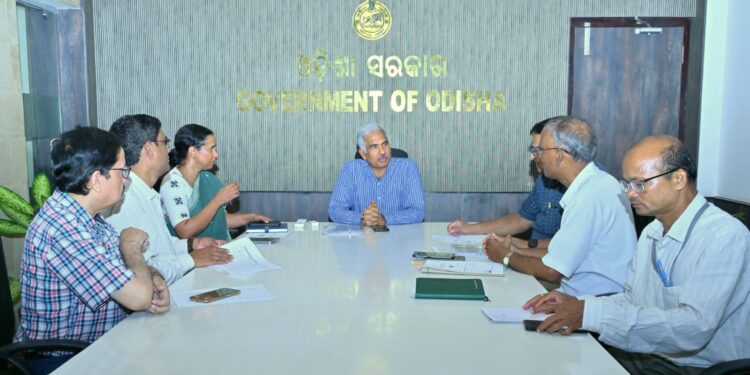As the monsoon season sets in early across Odisha, bringing with it the threat of infectious diseases, the state government has taken proactive steps to safeguard public health.
In a high-level review meeting held today, Chief Secretary Manoj Ahuja emphasised the urgent need for robust preventive measures to control the spread of diseases like malaria, dengue, jaundice, and cholera, which often surge during the rainy season.
The meeting, attended by Commissioner-cum-Secretary of the Health and Family Welfare Department, Smt. Aswathy S, along with senior health officials, outlined a comprehensive strategy to mitigate health risks.
With rainfall already underway, Odisha faces an increased risk of waterborne and vector-borne diseases. The Chief Secretary directed officials to identify dengue-prone areas, particularly in urban centres and municipal corporations, and sustain mosquito control initiatives. Measures such as the use of insecticide-treated mosquito nets and residual insecticide sprays were mandated for malaria-prone districts to curb the spread of the disease.
To tackle waterborne illnesses, the government has prioritised ensuring access to safe drinking water, disinfecting water sources, and conducting quality checks on food prepared by street vendors. “Preventive action is critical to protecting our communities,” said Shri Ahuja, urging officials to intensify efforts at the grassroots level.
A key focus of the meeting was public awareness. The Chief Secretary called for widespread campaigns, extending from rural villages to urban centres, to educate citizens on preventive measures. He advised the public to remain vigilant about monsoon-related ailments such as colds and coughs, with special attention to the elderly and those with weakened immunity due to pre-existing conditions. “Health awareness is our first line of defence. We must empower people with knowledge to stay safe,” he added.
The meeting also addressed the current COVID-19 situation in Odisha. While some states have reported a slight uptick in cases, Odisha’s situation remains stable. Over the past week, only 23 out of 546 tested samples were positive for COVID-19, with four patients already recovered and the remaining 19 under home treatment. None of the cases is severe. According to the Indian Council of Medical Research (ICMR), these infections are linked to the Omicron sub-variant, which poses no significant health threat. However, individuals with chronic illnesses or comorbidities were advised to exercise caution.
The state’s proactive approach includes collaboration across departments to ensure effective implementation of health measures. Senior officials, including the Special Secretary of the Health Department, Director of Health Services, and Director of Public Health, participated in the discussions, pledging to strengthen Odisha’s health infrastructure to meet the challenges of the monsoon season.
As Odisha braces for continued rainfall, the government’s multi-pronged strategy—combining mosquito control, water safety, public awareness, and vigilant monitoring of diseases—aims to keep the state’s residents safe and healthy.
The Chief Secretary’s directives underscore Odisha’s commitment to prioritising public health and preparedness in the face of seasonal challenges.





























